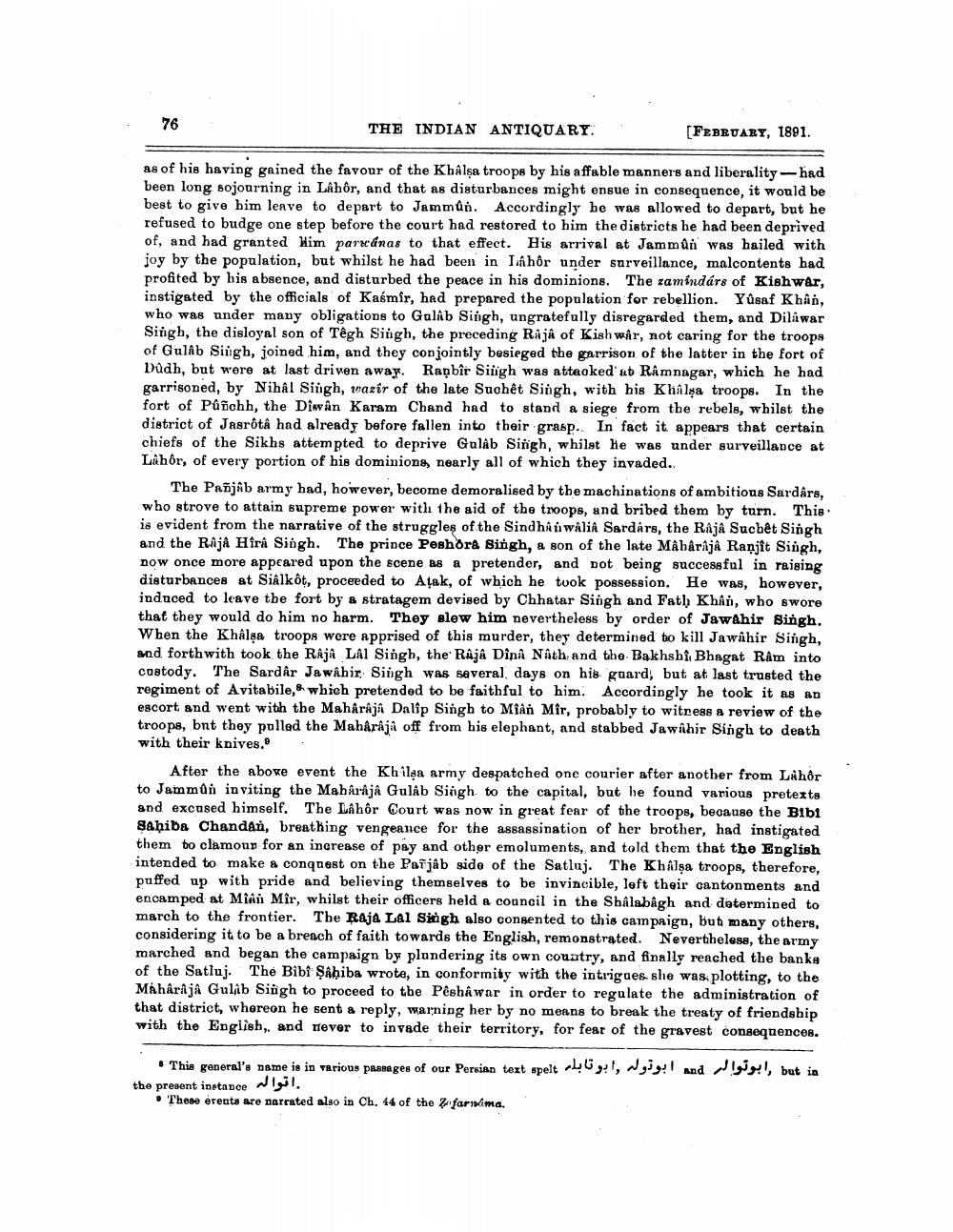________________
76
THE INDIAN ANTIQUARY
[FEBRUARY, 1891.
as of his having gained the favour of the Khalsa troops by his affable manners and liberality - had been long sojourning in Lâhôr, and that as disturbances might ensue in consequence, it would be best to give him leave to depart to Jammun. Accordingly he was allowed to depart, but he refused to budge one step before the court had restored to him the districts he had been deprived of, and had granted Him paracanas to that effect. His arrival at Jamman was hailed with joy by the population, but whilst he had been in Ihôr under surveillance, malcontents had profited by his absence, and disturbed the peace in his dominions. The zamindárs of Kishwar, instigated by the officials of Kaśmir, had prepared the population for rebellion. Yûsaf Khân, who was under many obligations to Gulab Singh, ungratefully disregarded them, and Dilawar Singh, the disloyal son of Têgh Singh, the preceding Råjå of Kish war, not caring for the troops of Gulab Singh, joined him, and they conjointly besieged the garrison of the latter in the fort of Dudh, but were at last driven away. Ranbir Singh was attacked' at Ramnagar, which he had garrisoned, by Nihal Singh, vazir of the late Suchêt Singh, with his Khalụa troops. In the fort of Púñchh, the Diwan Karam Chand had to stand a siege from the rebels, whilst the district of Jasrotâ had already before fallen into their grasp. In fact it appears that certain chiefs of the Sikhs attempted to deprive Gulab Singh, whilst he was under surveillance at Lahor, of every portion of his dominions, nearly all of which they invaded.
The Pañjab army had, however, become demoralised by the machinations of ambitious Sardars. who strove to attain supreme power with the aid of the troops, and bribed them by turn. This is evident from the narrative of the struggles of the Sindh úwália Sardárs, the Raja Sucbêt Singh and the Raja Hira Singh. The prince Peshora Singh, a son of the late Mâhârâjâ Ranjit Singh, now once more appeared upon the scene as a pretender, and not being successful in raising disturbances at Sialkot, proceeded to Atak, of which he took possession. He was, however, induced to leave the fort by a stratagem devised by Chhatar Singh and Fath Khan, who swore that they would do him no harm. They slew him nevertheless by order of Jawahir Singh. When the Khâlşa troops were apprised of this murder, they determined to kill Jawahir Singh, and forth with took the Raja LÂl Singh, the Raja Dinâ Näth and the Bakhshi, Bhagat Râm into costody. The Sardar Jawahir Singh was several days on his guard, but at last trusted the regiment of Avitabile, which pretended to be faithful to him. Accordingly he took it as an escort and went with the Maharaja Dalip Singh to Mîân Mir, probably to witness a review of the troops, bnt they pulled the Mahárajii off from his elephant, and stabbed Jawithir Singh to death with their knives.
After the above event the Khilsa army despatched one courier after another from Lähôr to Jammun inviting the Maharaja Gulab Singh to the capital, but he found various pretexts and excused himself. The Lâhôr Court was now in great fear of the troops, because the Bibi sahiba Chandan, breathing vengeance for the assassination of her brother, had instigated them to clamour for an increase of pay and other emoluments, and told them that the English intended to make a conquest on the Pasjáb side of the Satluj. The Kh Alşa troops, therefore, puffed up with pride and believing themselves to be invincible, left their cantonments and encamped at Mian Mir, whilst their officers held a council in the Shâlabagh and determined to march to the frontier. The Raja Lal Singh also consented to this campaign, but many others, considering it to be a breach of faith towards the English, remonstrated. Nevertheless, the army marched and began the campaign by plundering its own country, and finally reached the banks of the Satluj. The Bibi Şahiba wrote, in conformity with the intrigues she was plotting, to the Maharaja Gulib Singh to proceed to the Pêshåwar in order to regulate the administration of that district, whereon he sent a reply, warning her by no means to break the treaty of friendship with the English, and never to invade their territory, for fear of the gravest consequences.
dمد ابوتوله ,ابو تا بام name is in various pnnnnges of our Persian text spelt و'Thie general • but in ,ابرتوال
.اتوا له the present inetaree
• These érents are narrated also in Ch. 44 of the 2 farmima.




